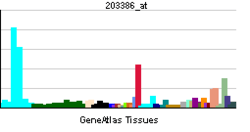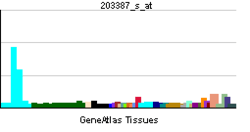TBC1D4
AS160 (Akt substrate of 160 kDa), which was originally known as TBC1 domain family member 4 (TBC1D4),[3] is a Rab GTPase-activating protein that in humans is encoded by the TBC1D4 gene.[4][5][6][7]
The 160 kD protein product was first discovered in a screen for novel substrates of the serine-threonine kinase Akt2, which phosphorylates AS160 at Thr-642 and Ser-588[3][8] after insulin stimulation.[9] Insulin stimulation of fat and muscle cells results in translocation of the glucose transporter GLUT4 to the plasma membrane, and this translocation process is dependent on phosphorylation of AS160.[10] The role of AS160 in GLUT4 translocation is mediated by its GTPase activating domain and interactions with Rab proteins in vesicle formation, increasing GLUT4 translocation when its GTPase activity is inhibited by Akt phosphorylation. Specifically, this inhibition activates RAB2A, RAB8A, RAB10 and RAB14.[11]
AS160 also contains a calmodulin-binding domain, and this domain mediates phosphorylation-independent glucose uptake in muscle cells.[12]
References
- ↑ "Human PubMed Reference:".
- ↑ "Mouse PubMed Reference:".
- 1 2 Sakamoto K, Holman GD (2008). "Emerging role for AS160/TBC1D4 and TBC1D1 in the regulation of GLUT4 traffic". Am. J. Physiol. Endocrinol. Metab. 295 (1): E29–37. doi:10.1152/ajpendo.90331.2008. PMC 2493596
 . PMID 18477703.
. PMID 18477703. - ↑ Kurihara LJ, Semenova E, Miller W, Ingram RS, Guan XJ, Tilghman SM (Feb 2002). "Candidate genes required for embryonic development: a comparative analysis of distal mouse chromosome 14 and human chromosome 13q22". Genomics. 79 (2): 154–61. doi:10.1006/geno.2002.6692. PMID 11829485.
- ↑ Kane S, Sano H, Liu SC, Asara JM, Lane WS, Garner CC, Lienhard GE (Jun 2002). "A method to identify serine kinase substrates. Akt phosphorylates a novel adipocyte protein with a Rab GTPase-activating protein (GAP) domain". The Journal of Biological Chemistry. 277 (25): 22115–8. doi:10.1074/jbc.C200198200. PMID 11994271.
- ↑ Matsumoto Y, Imai Y, Lu Yoshida N, Sugita Y, Tanaka T, Tsujimoto G, Saito H, Oshida T (Aug 2004). "Upregulation of the transcript level of GTPase activating protein KIAA0603 in T cells from patients with atopic dermatitis". FEBS Letters. 572 (1-3): 135–40. doi:10.1016/j.febslet.2004.07.023. PMID 15304337.
- ↑ "Entrez Gene: TBC1D4 TBC1 domain family, member 4".
- ↑ Sano H, Kane S, Sano E, Mîinea CP, Asara JM, Lane WS, Garner CW, Lienhard GE (Apr 2003). "Insulin-stimulated phosphorylation of a Rab GTPase-activating protein regulates GLUT4 translocation". The Journal of Biological Chemistry. 278 (17): 14599–602. doi:10.1074/jbc.C300063200. PMID 12637568.
- ↑ Kane S, Sano H, Liu SC, Asara JM, Lane WS, Garner CC, Lienhard GE (Jun 2002). "A method to identify serine kinase substrates. Akt phosphorylates a novel adipocyte protein with a Rab GTPase-activating protein (GAP) domain". The Journal of Biological Chemistry. 277 (25): 22115–8. doi:10.1074/jbc.C200198200. PMID 11994271.
- ↑ Sano H, Kane S, Sano E, Mîinea CP, Asara JM, Lane WS, Garner CW, Lienhard GE (Apr 2003). "Insulin-stimulated phosphorylation of a Rab GTPase-activating protein regulates GLUT4 translocation". The Journal of Biological Chemistry. 278 (17): 14599–602. doi:10.1074/jbc.C300063200. PMID 12637568.
- ↑ Mîinea CP, Sano H, Kane S, Sano E, Fukuda M, Peränen J, Lane WS, Lienhard GE (Oct 2005). "AS160, the Akt substrate regulating GLUT4 translocation, has a functional Rab GTPase-activating protein domain". The Biochemical Journal. 391 (Pt 1): 87–93. doi:10.1042/BJ20050887. PMC 1237142
 . PMID 15971998.
. PMID 15971998. - ↑ Kramer HF, Taylor EB, Witczak CA, Fujii N, Hirshman MF, Goodyear LJ (Dec 2007). "Calmodulin-binding domain of AS160 regulates contraction- but not insulin-stimulated glucose uptake in skeletal muscle". Diabetes. 56 (12): 2854–62. doi:10.2337/db07-0681. PMID 17717281.
Further reading
- Nagase T, Ishikawa K, Miyajima N, Tanaka A, Kotani H, Nomura N, Ohara O (Feb 1998). "Prediction of the coding sequences of unidentified human genes. IX. The complete sequences of 100 new cDNA clones from brain which can code for large proteins in vitro". DNA Research. 5 (1): 31–9. doi:10.1093/dnares/5.1.31. PMID 9628581.
- Nakayama M, Kikuno R, Ohara O (Nov 2002). "Protein-protein interactions between large proteins: two-hybrid screening using a functionally classified library composed of long cDNAs". Genome Research. 12 (11): 1773–84. doi:10.1101/gr.406902. PMC 187542
 . PMID 12421765.
. PMID 12421765.
- Lee SY, Obata Y, Yoshida M, Stockert E, Williamson B, Jungbluth AA, Chen YT, Old LJ, Scanlan MJ (Mar 2003). "Immunomic analysis of human sarcoma". Proceedings of the National Academy of Sciences of the United States of America. 100 (5): 2651–6. doi:10.1073/pnas.0437972100. PMC 151395
 . PMID 12601173.
. PMID 12601173.
- Beausoleil SA, Jedrychowski M, Schwartz D, Elias JE, Villén J, Li J, Cohn MA, Cantley LC, Gygi SP (Aug 2004). "Large-scale characterization of HeLa cell nuclear phosphoproteins". Proceedings of the National Academy of Sciences of the United States of America. 101 (33): 12130–5. doi:10.1073/pnas.0404720101. PMC 514446
 . PMID 15302935.
. PMID 15302935.
- Jin J, Smith FD, Stark C, Wells CD, Fawcett JP, Kulkarni S, Metalnikov P, O'Donnell P, Taylor P, Taylor L, Zougman A, Woodgett JR, Langeberg LK, Scott JD, Pawson T (Aug 2004). "Proteomic, functional, and domain-based analysis of in vivo 14-3-3 binding proteins involved in cytoskeletal regulation and cellular organization". Current Biology. 14 (16): 1436–50. doi:10.1016/j.cub.2004.07.051. PMID 15324660.
- Karlsson HK, Zierath JR, Kane S, Krook A, Lienhard GE, Wallberg-Henriksson H (Jun 2005). "Insulin-stimulated phosphorylation of the Akt substrate AS160 is impaired in skeletal muscle of type 2 diabetic subjects". Diabetes. 54 (6): 1692–7. doi:10.2337/diabetes.54.6.1692. PMID 15919790.
- Kim JE, Tannenbaum SR, White FM (2005). "Global phosphoproteome of HT-29 human colon adenocarcinoma cells". Journal of Proteome Research. 4 (4): 1339–46. doi:10.1021/pr050048h. PMID 16083285.
- Beausoleil SA, Villén J, Gerber SA, Rush J, Gygi SP (Oct 2006). "A probability-based approach for high-throughput protein phosphorylation analysis and site localization". Nature Biotechnology. 24 (10): 1285–92. doi:10.1038/nbt1240. PMID 16964243.
- Treebak JT, Birk JB, Rose AJ, Kiens B, Richter EA, Wojtaszewski JF (Mar 2007). "AS160 phosphorylation is associated with activation of alpha2beta2gamma1- but not alpha2beta2gamma3-AMPK trimeric complex in skeletal muscle during exercise in humans". American Journal of Physiology. Endocrinology and Metabolism. 292 (3): E715–22. doi:10.1152/ajpendo.00380.2006. PMID 17077344.
- Olsen JV, Blagoev B, Gnad F, Macek B, Kumar C, Mortensen P, Mann M (Nov 2006). "Global, in vivo, and site-specific phosphorylation dynamics in signaling networks". Cell. 127 (3): 635–48. doi:10.1016/j.cell.2006.09.026. PMID 17081983.
- Ewing RM, Chu P, Elisma F, Li H, Taylor P, Climie S, McBroom-Cerajewski L, Robinson MD, O'Connor L, Li M, Taylor R, Dharsee M, Ho Y, Heilbut A, Moore L, Zhang S, Ornatsky O, Bukhman YV, Ethier M, Sheng Y, Vasilescu J, Abu-Farha M, Lambert JP, Duewel HS, Stewart II, Kuehl B, Hogue K, Colwill K, Gladwish K, Muskat B, Kinach R, Adams SL, Moran MF, Morin GB, Topaloglou T, Figeys D (2007). "Large-scale mapping of human protein-protein interactions by mass spectrometry". Molecular Systems Biology. 3 (1): 89. doi:10.1038/msb4100134. PMC 1847948
 . PMID 17353931.
. PMID 17353931.
- Howlett KF, Sakamoto K, Garnham A, Cameron-Smith D, Hargreaves M (Jun 2007). "Resistance exercise and insulin regulate AS160 and interaction with 14-3-3 in human skeletal muscle". Diabetes. 56 (6): 1608–14. doi:10.2337/db06-1398. PMID 17369524.
- Frøsig C, Rose AJ, Treebak JT, Kiens B, Richter EA, Wojtaszewski JF (Aug 2007). "Effects of endurance exercise training on insulin signaling in human skeletal muscle: interactions at the level of phosphatidylinositol 3-kinase, Akt, and AS160". Diabetes. 56 (8): 2093–102. doi:10.2337/db06-1698. PMID 17513702.


 . PMID 18477703.
. PMID 18477703. . PMID 15971998.
. PMID 15971998. . PMID 12421765.
. PMID 12421765. . PMID 12601173.
. PMID 12601173. . PMID 15302935.
. PMID 15302935. . PMID 17353931.
. PMID 17353931.